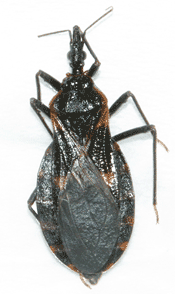 If you think bed bugs are creepy, consider the kissing bug. This insect, like the bed bug, comes out primarily at night for its blood meals. Much larger than the bed bug, some kissing bugs approach an inch in length. Also, unlike the bed bug, kissing bugs are known to carry a serious illness, called Chagas disease, that can affect humans.
If you think bed bugs are creepy, consider the kissing bug. This insect, like the bed bug, comes out primarily at night for its blood meals. Much larger than the bed bug, some kissing bugs approach an inch in length. Also, unlike the bed bug, kissing bugs are known to carry a serious illness, called Chagas disease, that can affect humans. In a new paper published in the journal Vector-Borne and Zoonotic Diseases, researcher Sonia Kjos and associates describe first survey of the kissing bug species in Texas in many years. Using new DNA-based techniques they were able to tell how many of the insects they collected were infected with the parasite.
The study confirms the presence of kissing bugs through most areas of Texas (97 of 254 counties), and shows that over half the bugs collected from domestic settings tested positive for the disease pathogen. Dogs seem to be especially at risk for the disease where these bugs are present, possibly because they may eat the bugs whenever they can. Over 530 cases of Chagas disease have been confirmed in dogs in Texas over the past 15 years.
Ready for some good news? The disease, for reasons not fully understood, remains very rare in humans in Texas. Only 6 cases have been confirmed since 1955 when the first incident was recorded in the medical literature. Tighter house construction and different sanitation standards could account for the lower infection rates in Texas compared to northern Mexico, where some of the same kissing bug species are found. In any case there is much more to be learned about this secretive and creepy bug. In the meantime, thanks to Sonia and her team for shedding a little more light on this important pest and disease.
3 comments:
Here is another bit article from WOAI ...
"SAN ANTONIO -- A disease once thought to be confined to Latin America is now showing up in Bexar County. It’s called "Chagas disease."
For years it's not been considered a problem in the U.S. But, now local health experts have found at least 26 individuals who've been exposed or infected by the disease."
6/16/2010 I found a kissing bug in my washing machine today. Does anyone keep track of these insects or need to report finding them? Poteet, Texas
No place to report these to my knowlege. They are relatively common insects if you know how to collect them. The only time you might want to collect one is if you found it feeding on you or a family member. If this happens, keep the bug alive if possible and call your department of state health services.
Post a Comment